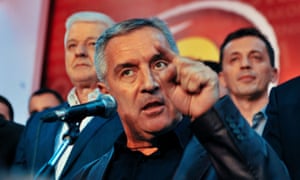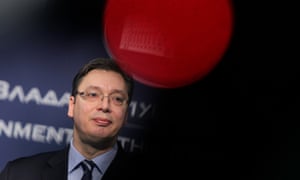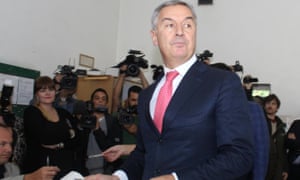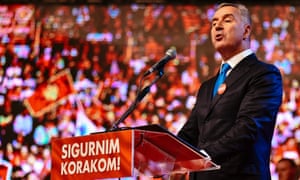Plani ishte që të krijohen trazira në Parlamentin e Podgoricës, të qëllohet Millo Gjukanoviq dhe të instalohet një parti pro-Moskës
Serbia ka deportuar një grup të rusëve të dyshuar për përfshirjen në një komplot për grusht-shtet në Malin e Zi, mëson The Guardian, transmeton Gazeta Express, duke kërcënuar jetën e dy kryeministrave europianë.
Komplotistët dyshohet se u veshën me uniforma të policisë për ta sulmuar Parlamentin e Malit të Zi në Podgoricë, kryeministrin Millo Gjukanoviq dhe për të instaluar një parti pro-Moskës.
Involvimi i rusëve në komplotin e tetorit ka rritur intrigën për ambiciet e Moskës në një pjesë të Europës që mendohej deri tani se do të gravitojë drejtë orbitës së BE’së.
Një grup prej 20 serbëve dhe malazezëve, disa prej të cilëve kishin luftuar me separatistët e mbështetur nga Moska në Ukrainën lindore, u arrestuan në Podgoricë, kryeqytetin e Malit të Zi. Në Serbi, ndërkohë, disa shtetas rusë janë dyshuar për koordinim të komplotit dhe u kapën me 120 mijë euro dhe uniforma të forcave speciale.
Sipas të përditshmes në Beograd “Danas” rusët gjithashtu kishin pajisje dhe ishin në gjendje të jenë të informuar për çdo gjurmë të vendndodhjes së Gjukanoviqit.
Burimet diplomatike të “The Guardian” thonë se qeveria e Beogradit në heshtje ka dëbuar rusët pas ndërhyrjes së kryetarit të Këshillit të Sigurimit të Rusisë, Nikolai Patrushev, i cili fluturoi në Beograd më 26 tetor, në një përpjekje të dukshme për përmbajtjen e skandalit. Ministri i brendshëm i vendit, Nebojsha Stefanoviq mohoi se qeveria ka kryer ndonjë dëbim lidhur me komplotin.
Sipas burimeve të afërta të “The Guardian”, qeveria në Beograd tha për Patrushev, ish-shefi i FSB’së (Shërbimit Federal të Sigurisë), se i kërkoi falje për atë që e karakterizuan si një operacion mashtrues që nuk kanë bekimin e Kremlinit.
Po ashtu edhe Qeveria serbe u trondit tri ditë pas vizitës së Patrushev, kur një sasi e armëve është gjetur në afërsi të shtëpisë së kryeministrit serb, Aleksandar Vuçiq. Armët u zbuluan në një udhëkryq ku makina e Vuçiq normalisht do ta ngadalësonte në rrugën që çon për në shtëpinë e tij.
Stefanoviq tha se kishte “dyshime të forta” se një bandë e organizuar kriminale ishte punësuar për ta vrarë Vuçiqin për 10 milionë euro, por ai nuk do e përcaktojë se kush ishte pas komplotit të dyshuar, duke thënë se hetimet e mëtejme do të tregojnë nëse njerëzit “jashtë rajonit” ishin të përfshirë.
“Ne e dimë se njerëzit që janë potencialisht të punësuar për të bërë punë të tilla janë nga rajoni, e jo nga Serbia dhe ka pasur grupe kriminale që veprojnë në rajon që janë të përfshirë. Por, këta janë vetëm përsonat që e tërheqin këmbëzën”, ka thënë Stafanoviq.
“Do të ketë ndryshime në shërbimet sekrete”, tha Vuçiq për Radio Televizionin e Serbisë.
Ende është e paqartë se cila ishte lidhja e personave që deshën të kryejnë vrasjen e Vuçiq dhe Gjukanoviq. Por, besohet se krejt kjo ishte lidhje e mbështetur nga konkurrenca lindje-perëndim./
Serbia deports Russians suspected of plotting Montenegro coup
Plotters were allegedly going to storm Podgorica parliament, shoot Milo Ðjukanović and install a pro-Moscow party
Serbia has deported a group of Russians suspected of involvement in a coup plot in neighbouring Montenegro, the Guardian has learned, in the latest twist in a murky sequence of events that apparently threatened the lives of two European prime ministers.
The plotters were allegedly going to dress in police uniforms to storm the Montenegrin parliament in Podgorica, shoot the prime minister, Milo Ðjukanović, and install a pro-Moscow party.
The Russian fingerprints on the October plot have heightened intrigue about Moscow’s ambitions in a part of Europe hitherto thought to be gravitating towards the EU’s orbit.
A group of 20 Serbians and Montenegrins, some of whom had fought with Moscow-backed separatists in eastern Ukraine, were arrested in Podgorica, the Montenegrin capital. In Serbia, meanwhile, several Russian nationals suspected of coordinating the plot were caught with €120,000 and special forces uniforms.
According to the Belgrade daily, Danas, the Russians also had encryption equipment and were able to keep track of Đjukanović’s whereabouts.
Diplomatic sources told the Guardian the Belgrade government quietly deported the Russians after the intervention of the head of the Russian security council, Nikolai Patrushev, who flew to Belgrade on 26 October in an apparent effort to contain the scandal. The country’s interior minister, Nebojša Stefanović denied the government carried out any deportations connected to the plot.
A source close to the Belgrade government said Patrushev, a former FSB (federal security service) chief, apologised for what he characterised as a rogue operation that did not have the Kremlin’s sanction. In Moscow, a Security Council official told Tass that Patrushev “didn’t apologise to anyone, because there is nothing to apologise for”.
The Serbian government was further rattled three days after Patrushev’s visit when a cache of arms was found near the home of the prime minister, Aleksandar Vučić. The weapons were discovered at a junction where Vučić’s car would normally slow down on his way to the house.
Stefanović said there were “strong suspicions” that an organised crime gang had been hired to kill Vučić for €10m, but he would not specify who was behind the alleged plot, saying further investigation would show whether people “outside the region” were involved.
“You know the people who don’t like a strong Vučić or a strong government of Serbia and who could contribute some money, €10m or so, to see this kind of thing done,” Stefanović told the Guardian.
“We know that the people who were potentially hired to do this kind of thing were from the region, but not from Serbia, and that there were crime groups that are operating in the region that were involved. But these were just the trigger persons,” the minister added.
“We believe that criminal gangs are just being used to do the job, but the motives are not linked to the gangs. The assassination of the prime minister is not something that even they would do lightly, we believe they are being used.”
Since the discovery of the weapons, Vučić has announced plans to shake up the intelligence service, saying the security situation was “even more serious than we expected”.
“There will be changes in the secret service,” he told the public broadcaster, RTS. “I believed in the skills of people who didn’t show that they have these capacities, but I’ll take responsibility for this.”
It is unclear whether there is a connection between the alleged assassination plots against Vučić and Đjukanović. But the intrigue of the past month comes against a backdrop of fierce east-west competition.
Đjukanović has been instrumental in pulling his country to the verge of Nato membership – an accession protocol was signed in May – which has dashed Russian hopes of securing a naval foothold on the Adriatic. According to the Montenegrin press, Moscow lobbied hard in recent years for transit and maintenance facilities at the ports of Bar and Kotor.
The importance of such facilities was demonstrated late last month when the Russian carrier, the Admiral Kuznetsov and its battle group was denied refuellingin European ports along their way to support the Russian military effort in Syria.
In Serbia, Vučić has been seeking a delicate balance between Nato and Russia, and the country’s armed forces have conducted military exercises with both, although far more frequently in recent years with Nato. Vučić has also refused to grant diplomatic status to Russian officials staffing a Serbian-Russian humanitarian centre established in the city of Niš in 2012, infuriating Moscow.
Western officials suspect the centre of being a Trojan horse, which could expanded as a hub for intelligence and paramilitary operations in the region. Diplomatic status, they point out, would have allowed equipment to be brought in without oversight by Serbian customs.
Some analysts have suggested the operation could have been mounted as a “semi-freelance” one, giving enough distance from Moscow to be plausibly deniable if was uncovered.
“Both sides have an interest in playing this as a freelance, vigilante-type thing, it allows them both to save face. Whether that’s actually true is unclear. There’s simply not enough evidence either to support or disprove it,” said Vladimir Frolov, a Moscow-based analyst.
“Judging from the amount of logistical and financial support they got, it looks likely they acted with at least a tacit understanding that this was sanctioned.”
A few days after the would-be coup, a former intelligence officer, Leonid Reshetnikov, who ran a hawkish research institute in Moscow, was relieved of his duties by Putin. The Russian Institute for Strategic Studies has a branch office in Belgrade, and Reshetnikov had given strong backing to the anti-Nato opposition party in Montenegro.
A security analyst from the region, who did not want to be named, said his understanding from intelligence sources was that the incidents in the Balkans were probably linked to Russian attempts to gain influence and leverage in the Balkans in the run-up to an anticipated Hillary Clinton US presidency, which was expected to take a harder line on Russian activity in the region.
In Moscow, the Russian foreign ministry took a dim view of this Guardian report on the Balkan events.
Maria Zakharova, spokeswoman for the Russian foreign ministry wrote on Facebook: “The publication in the Guardian with a link to ‘sources’ saying that Patrushev apologised for ‘Russian nationalists’ who had planned to kill the prime minister of Montenegro is a classic provocation aimed at spreading knowingly false information.”
“I declare you “liars of the day”. You can sew your own hat.”
Since you're here ...
…we have a small favour to ask. More people are reading the Guardian than ever but far fewer are paying for it. And advertising revenues across the media are falling fast. So you can see why we need to ask for your help. The Guardian’s independent, investigative journalism takes a lot of time, money and hard work to produce. But we do it because we believe our perspective matters – because it might well be your perspective, too.
Fund our journalism and together we can keep the world informed.
Montenegro's PM quits after suggesting Russia had role in election plot
Prime minister said that there was a ‘strong connection of a foreign factor’ in alleged conspiracy to take over the Montenegrin parliament on election day
Montenegro’s long-serving prime minister is to step down, the governing Democratic Socialist party has said, and will be replaced by his deputy, Duško Marković.
Tuesday’s announcement came hours after Milo Đukanović, who has governed as Montenegro’s prime minister or president for a total of 21 years since 1991, announced his government was investigating a possible Russian role in an alleged 16 October coup plot aimed at derailing the country’s elections.
It is unclear whether there is any connection between Đukanović’s claims of a coup and his abrupt departure. Party officials were quoted as saying that he would be replaced by Marković as its candidate for prime minister if it was able to secure a majority coalition in post-election negotiations.
Đukanović, whose time in office has been dogged by allegations of authoritarianism and corruption, has retired from leadership on two previous occasions, in 2006 and 2010, before returning to the helm.
Đukanović had said there was a “strong connection of a foreign factor” in the alleged conspiracy to take over the Montenegrin parliament on election day, adding that the country’s authorities would investigate the extent of involvement of Russia and Serbia. Twenty people, including the former commander of special police in neighbouring Serbia, were arrested on the day of the would-be coup attempt.
The Serbian prime minister, Aleksandar Vučić, announced on Monday night that Serbian police had made more arrests of people suspected of following Đukanović and planning unspecified crimes in Montenegro.
“We have seized uniforms, money and other things, and have informed the special prosecution in Montenegro of what we know,” Vučić told a press conference. He said the suspects had no connection to the Serbian state but did have ties to an unnamed third country.
Russia’s security chief, Nikolai Patrushev, was expected in Belgrade to hold talks with Serbian leaders in the wake of the arrests, according to reports from the Serbian capital. Those reports said Patrushev had come to discuss terrorism, the migrant crisis in Europe and alleged extremism in Kosovo.
Đukanović faced stiff opposition from a pro-Russian coalition opposing the country’s proposed membership of Nato. Leaders of the Democratic Front made frequent visits to Moscow in the run-up to the election. Đukanović’s party won the vote, but not an absolute majority, and Montenegro’s Nato membership is awaiting ratification by member states.
Bratislav Dikić, the former commander of the Serbian gendarmerie who was arrested on 16 October in Montenegro, has denied involvement in any coup attempt, saying Montenegrin police had planted a phone on him as well as keys to a warehouse containing weapons.
The Montenegrin prosecutor’s office said last week it had reasonable suspicion that a criminal group had been formed in Serbia and Montenegro with the intention of attacking the police guard at the parliament in Podgorica, taking over the assembly and declaring the winner of the election.
Seventeen years after the Kosovo war, the last of the conflicts that marked the disintegration of Yugoslavia, tensions are still high in the region. Serbia, backed by Russia, refuses to recognise Kosovo’s independence, while Bosnia’s sovereignty is under constant pressure from Serb and Croat separatists. Stjepan Mesić, a former Croatian president, claimed that leaders of both communities were seeking to break up Bosnia, warning that it could lead to a new war.
Adding to the febrile atmosphere, the Serbian government announced that an interior ministry official had been arrested for contacts with western intelligence. The interior minister, Nebojša Stefanović, said the authorities had “neutralised this person through effective action” but gave no further details.
Montenegrin prosecutor says Russian nationalists behind alleged coup plot
Milivoje Katnić says nationalists organised criminal group that planned to break into parliament and assassinate prime minister
Russian nationalists were behind an alleged coup attempt in Montenegro that included plans to assassinate the pro-western prime minister over his government’s attempt to join Nato, the country’s chief special prosecutor has said.
Milivoje Katnić said an investigation concluded that “nationalists from Russia” organised a criminal group, which planned to break into the Montenegrin parliament on election day, kill the prime minister Milo Đukanović and bring a pro-Russian coalition to power.
About 20 Serbian and Montenegrin citizens, including a former commander of Serbia’s special police forces, were arrested in Montenegro on 16 October. Fourteen remain in custody, including some who have fought for pro-Russia rebels in eastern Ukraine.
Russian officials deny any involvement, but have openly supported so-called patriotic parties that oppose Montenegro’s application for Natomembership.
Katnić told reporters: “We don’t have any evidence that the state of Russia is involved in any sense ... But we have evidence that two nationalists from Russia were organisers.”
Serbian authorities are said to have deported an unspecified number of Russian operatives monitoring Đukanović’s movements from Serbian territory.
“Special prosecution of Serbia had those persons under its supervision ... and prevented them from realising their plan,” Katnić said. “Those persons are not on the territory of Serbia any more. I don’t know where they are now, in Russia or somewhere else.”
He said 500 people were intended to enter Montenegro on election night to “cause violence ... and hire professional sharpshooters to kill the prime minister” as part of the planned coup.
“The plan was to stop Montenegro on its Euro-Atlantic path, especially to prevent it from entering Nato,” Katnić said.
Montenegro has been invited to join the military alliance despite strong opposition from Russia. The country’s accession would mean Russia losing strategic access to the Adriatic Sea and an ally in the Balkans.
Nato’s deputy secretary general, Rose Gottemoeller, who visited Montenegro last week, said she expects the country to become a member in spring 2017 after all 28 Nato member states ratify the agreement in their respective parliaments.








No comments:
Post a Comment